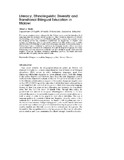| dc.contributor.author | Matiki, A.J. | |
| dc.date.accessioned | 2010-02-24T13:22:19Z | |
| dc.date.available | 2010-02-24T13:22:19Z | |
| dc.date.issued | 2006 | |
| dc.identifier.citation | Matiki, A.J. (2006) Literacy, ethnolinguistic diversity and transitional bilingual education in Malawi, The Intearnational Journal of Bilingual Education and Bilingualism, Vol. 9, No. 2, pp 239-254 | en_US |
| dc.identifier.issn | 1367-0050 | |
| dc.identifier.uri | http://hdl.handle.net/10311/469 | |
| dc.description.abstract | This paper examines recent attempts by the Malawi government to introduce local
languages into the primary school system and other secondary domains of national life, breaking more than 30 years of Chichewa/English monopoly. In a country where the language policy has essentially established the hegemony of English over indigenous languages, the fundamental question that this policy must consider
should revolve around the role that these languages can play in the development of Malawi(ans) from a traditionally oral to an increasingly literate culture, ever more connected to the international community through the English language. For many
Malawians, economic success is predicated on one’s ability to speak, read and write
English. There are, therefore, enormous attitudinal, political, economic and social problems that the policy has to contend with. | en_US |
| dc.language.iso | en | en_US |
| dc.publisher | Taylor & Francis, http://www.tandif.co.uk/journals | en_US |
| dc.subject | Bilingual education | en_US |
| dc.subject | language policy | en_US |
| dc.subject | literacy | en_US |
| dc.subject | Malawi | en_US |
| dc.title | Literacy, ethnolinguistic diversity and transitional bilingual education in Malawi | en_US |
| dc.type | Published Article | en_US |

